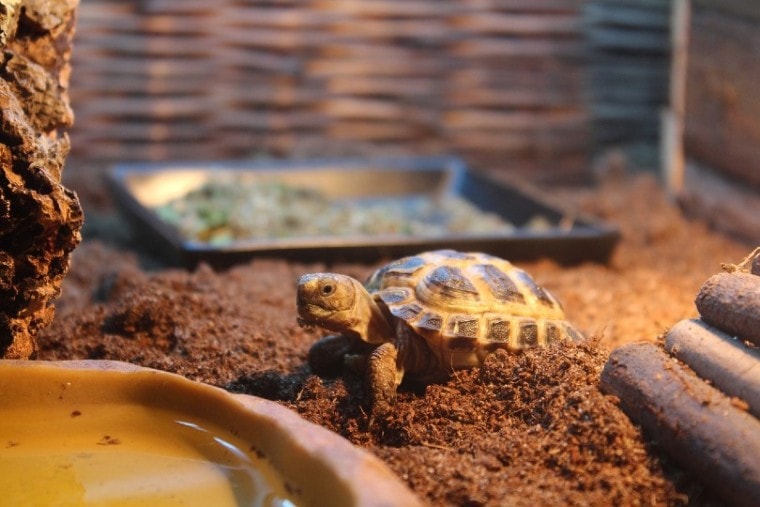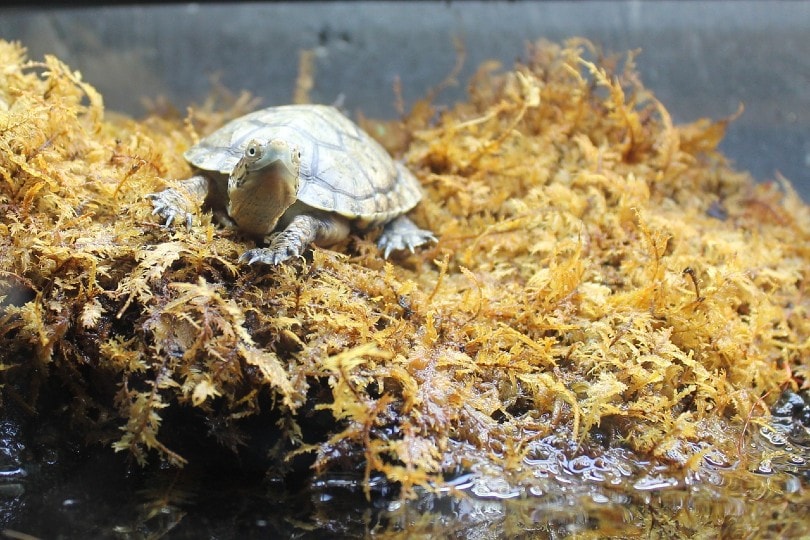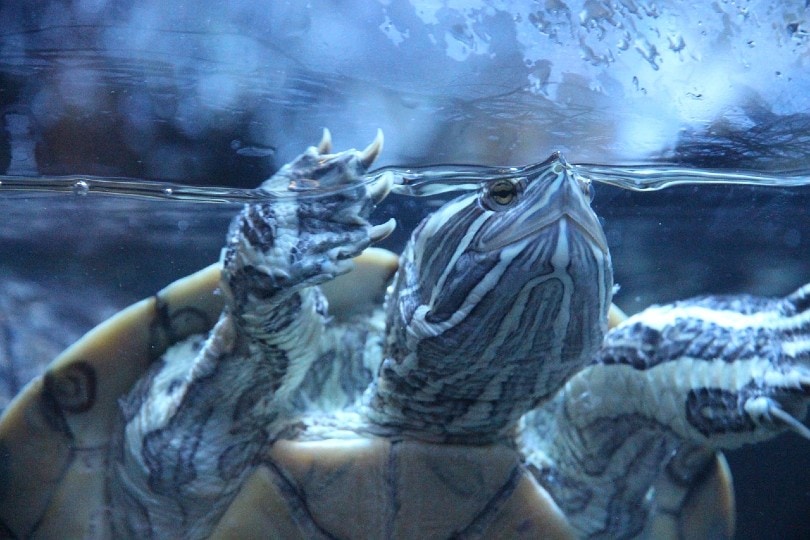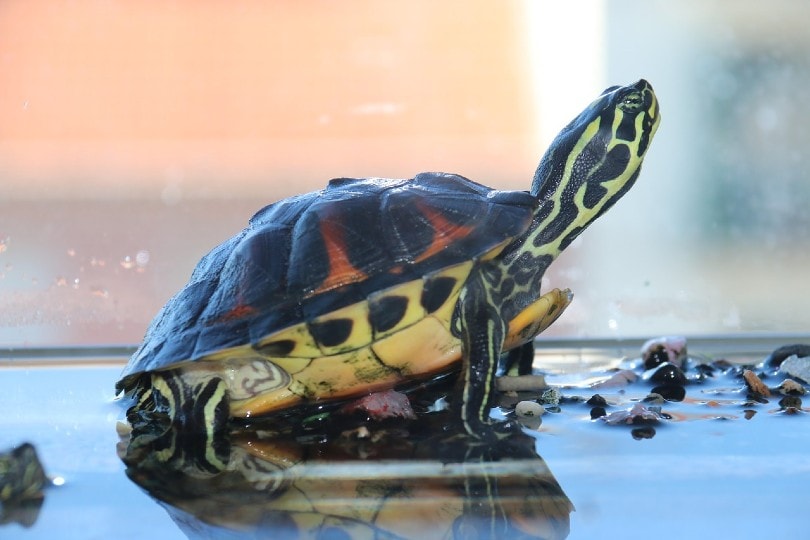
Many turtles live happily inside their tank without ever developing the desire to climb out. At the same time, other turtles feel the need to spread their roots and climb out of their tanks. If your turtle keeps trying to climb out, you are probably wondering why.
There are quite a few reasons as to why your turtle would keep trying to climb out of its tank. In this article, we are going to look at the four most common reasons, as well as what you can do about it. Most likely, the tank does not provide a suitable habitat for your turtle, but there are other reasons as well.
Keep reading to find out why your turtle keeps trying to climb out of its tank.
The 4 Reasons Why Your Turtle Keeps Trying to Climb Out of Its Tank
1. Unsuitable Tank Conditions
The most common reason that turtles try to climb out of their tanks is that the tank does not provide a suitable habitat. Even though many people think turtles just need a bit of water and a rock to lay on, turtles need a lot more care and attention than that.
Size
The first thing you want to check about your tank is that it is the right size for your turtle. Many turtle owners make the mistake of buying a tank that is way too small for their turtle. Even though turtles are small, they need a whole lot of space to swim and move.
The general rule of thumb for tank sizing is that a 1-inch shell length needs a 10-gallon tank at the least. As the shell gets longer, you will need to get a bigger tank. Do the math based on your turtle’s shell length and determine how large its tank needs to be.
Hiding Spaces
Another issue with the tank is that it may not provide enough hiding places. As a prey animal, turtles are naturally skittish and need a lot of places to hide. If your turtle’s tank does not provide hiding places, the turtle may try to escape in order to find one.
Basking Areas
While your turtle needs hiding places, they also need basking areas. If your turtle does not have a basking area, it cannot be healthy or warm. Turtles sometimes escape if their basking area is nonexistent or not suitable for their needs. Of course, not all turtles need to bask, but most turtles that are kept as pets require basking areas.
Cleanliness
Your tank may not be a suitable habitat if you do not clean it either. Just like us, turtles and other animals need a sanitary living condition. If the tank is dirty, the water is dirty, or there are any other issues, the turtle may try to escape in order to find healthier conditions. Make sure to filter out the water and use a water testing kit to ensure it has the right parameters.
Most likely, your turtle is escaping because its tank is not habitable for any of the reasons described above. Simply adjusting the issue should mitigate your turtle’s attempts of escape.

2. Stress and Anxiety
Stress is another reason why your turtle may be trying to escape its tank. An unsuitable habitat can be a stressor, but so can other incidents as well. For example, a pregnant turtle or a tank placed in a loud or obnoxious location can all cause stress to the turtle. As a prey animal, turtles get stressed easily and will try to find safer locations if they feel stressed.
3. There Is an Exit Spot
Turtles are curious by nature, even though they are skittish too. If there is an exit spot in their tank you are unaware of, the turtle may be attempting to escape simply out of curiosity. This option is not likely, but it is possible. Inspect the tank to make sure there are no exit points your turtle is trying to reach.

4. Turtles Aren’t Meant for Captivity
Unfortunately, the last reason that your turtle may be trying to escape is that they aren’t meant for captivity. Turtles need to explore, hunt, and have a lot of space to keep their body and mind stimulated. Tanks simply cannot provide what nature provides naturally.
Because turtles aren’t meant for captivity, they can become bored or depressed if their environment is not stimulating enough. Trying to replicate the turtle’s natural habitat is the best course of action for making the turtle feel at home inside its tank.
Top 3 Things You Can Do About It
If your turtle is trying to escape its tank, there is likely an issue that needs to be addressed. Addressing the issue should help decrease the turtle’s desire or ability to escape its tank.
1. Fix the Tank
The most important thing you should do if you notice your turtle is trying to escape is to ensure that its habitat is suitable. As we mentioned above, you want the tank to replicate the turtle’s natural environment to the best of your ability. This includes a spacious tank, enough water, a basking area, foliage for hiding, and a number of other physical and mental stimulants.
As you are adjusting the tank, make sure there are no exit spots and address any spots you may find. Most likely, the exit spots will be at the top of the tank. Once again, creating a natural environment within the tank should mitigate the turtle’s desire to escape in the first place.

2. Clean the Tank Regularly
Clean the tank. Get a water testing kit to ensure the water you’re putting in the tank is suitable for turtles. You want the nitrate, nitrite, and ammonia levels to be incredibly low. Add filters to your water to ensure that the water remains clean.
Keep up with the cleaning routine to keep the tank clean in the long run too. It is recommended to clean out your turtle’s tank once a week. Buying water pH tests can help you know exactly when the tank needs to be cleaned, saving you a bit of time or effort.
3. Reduce Stressors
Finally, try to reduce stress for the turtle. A stressed turtle is one that tries to escape to find more hiding areas. Providing a tank with suitable conditions will do a lot of the work but try to place the tank away from any potential stressors.

Final Thoughts
Most often, turtles try to escape their tanks because the tank does not provide a suitable habitat. Whether the tank is too small, dirty, or does not provide enough stimulation, turtles will try to escape. Additionally, they can try to escape because of stress, exit spots, and the very fact that they are not meant for captivity.
By focusing on your turtle’s tank, you will likely reduce the turtle’s desire to escape. Make sure the tank is large enough for your turtle and is constantly clean. These two steps will solve the problem for most turtle owners.
See also:
Featured Image Credit: Kantije, Pixabay








